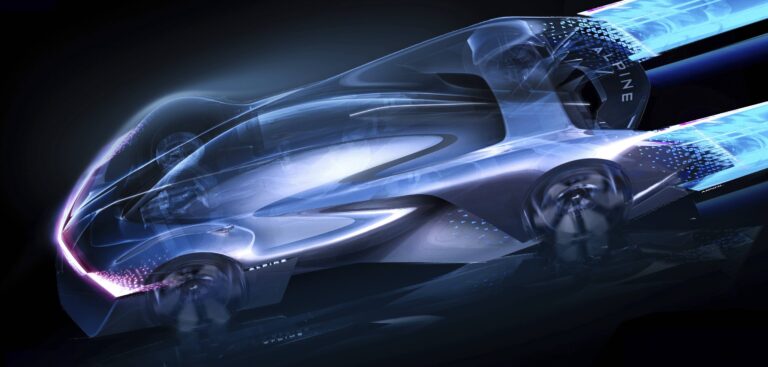Alpine recently unveiled its Alpenglow concept car at the Paris motor show, giving a good indication of the brand’s pursuit of hydrogen technology, both ICE and fuel cell, in parallel with its BEV development. Though only a concept, the stylized Alpenglow is envisaged to house a pair of high-pressure storage tanks along its flanks, feeding an H2-prepared ICE mounted amidships. Following a similar approach to the Viritech Apricale FCEV hypercar, and in keeping with Alpine’s ethos, there is considerable focus on lightweight structures to keep the mass of the vehicle low.
“Alpenglow’s mighty and lavish design hints at what Alpine cars will be like tomorrow and at our vision for motorsports moving forward. With hydrogen technology on board, we are strengthening our commitment to a responsible future and to keeping driving pleasure as real as ever,” commented Laurent Rossi, Alpine’s CEO.
Parent company Renault is also pursuing H2 FCEV power through Hyvia, a JV between it and fuel cell developer Plug Power, with the first production version of a Renault Master hydrogen-FC-powered van also unveiled in Paris.
“Hyvia is a human, technological and industrial adventure, moving fast since its creation a little over a year ago, facing big challenges. And here we are, proud to present the production version of our hydrogen-powered Renault Master Van H2-Tech,” said David Holderbach, Hyvia’s CEO. “Two weeks ago, Hyvia was recognized as one of the 10 confirmed projects in France that are part of the Important Project of Common European Interest. The hydrogen revolution is on. In a context of urgent energy transition, more and more strategic partners are starting test phases with our H2 vehicle. We are also continuing to deploy our H2 ecosystem in our plant in Flins, with the ramp-up of our fuel cell assembly and testing line and the ongoing installations of our line for charging stations. Our first electrolyzer is being installed.”


